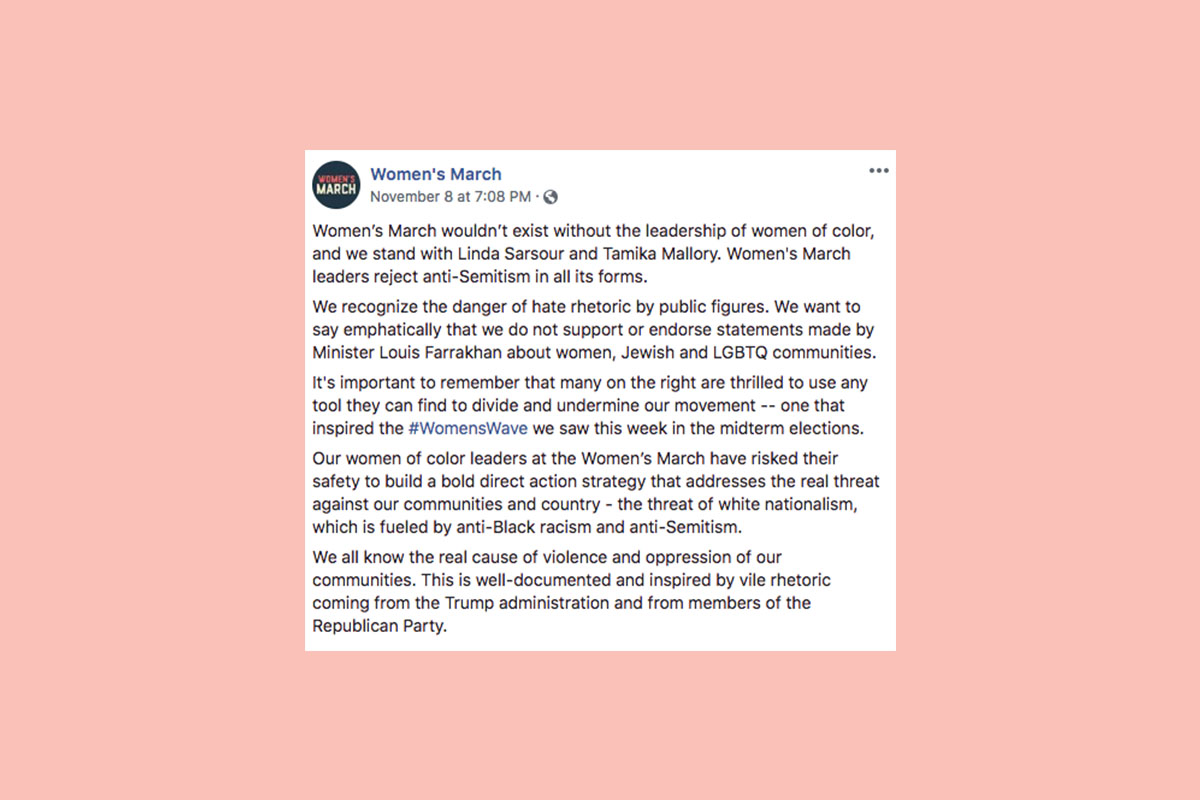Actress Alyssa Milano recently called out anti-Semitism among the Women’s March leadership, bringing renewed attention to the problem of anti-Semitism in the movement. Which, super quick recap: Leaders Linda Sarsour and Tamika Mallory have refused to denounce Louis Farrakhan, who they have praised and supported in the past. Farrakhan is a notorious anti-Semite, homophobe, transphobe, and misogynist.
In the aftermath of the Alyssa Milano news, the Women’s March released a statement on November 8 in which they wrote, “Women’s March wouldn’t exist without the leadership of women of color, and we stand with Linda Sarsour and Tamika Mallory. Women’s March leaders reject anti-Semitism in all forms.”
“We recognize the danger of hate rhetoric by public figures,” the statement continued. “We want to say emphatically that we do not support or endorse statements made by Minister Louis Farrakhan about women, Jewish and LGBTQ communities.”
Women’s March leaders stand against anti-Semitism in all its forms: pic.twitter.com/KLC3W4zZ2H
— Women's March (@womensmarch) November 9, 2018
Many people had a problem with this.
For starters, this statement isn’t from Sarsour or Mallory. The statement doesn’t denounce Farrakhan; they simply “do not support or endorse” specific comments made by him. They also point blame towards the Trump administration, ignoring the (liberal) Jewish women who have found anti-Semitism present in many progressive circles. As Ariel Sobel wrote in The Forward, “They are co-opting the realities of white feminism and right-wing bigotry to erase Jewish and LGBTQ people and say our dignity is not worthy of their defense. Instead, they keep on patronizing Jews, claiming anti-Semitism is not the biggest threat, so let’s let it slide!”
And they don’t have an action plan for actively fighting anti-Semitism.
As I pointed out in an article last February, their Unity Principles still don’t include Jewish women. Even in the wake of rising anti-Semitism and horrific attacks on synagogues, the hatred against Jews is not enough to be included in the Women’s March principles. (We have tips for making your intersectional feminism inclusive to Jewish women: step one is acknowledge Jewish women and the rise of anti-Semitism.)
Asking Sarsour & Mallory to EITHER step down from WM OR condemn Farrakhan and antisemitism isn't white women scripting the language of WOC. We've been asking for months to have a respectful dialogue about antisemitism. We can't be forced to ignore it especially in this climate /4
— Dr. Mia Brett (@QueenMab87) November 9, 2018
Recently, a Human Rights Award to the Women’s March from a German NGO was rescinded due to anti-Semitism. They wrote, “We believe that the Women’s March USA does not meet the criteria of this award, as its organizers have repeatedly attracted attention through antisemitic statements, the trivialization of antisemitism and the exclusion of Zionists and Jews since Women’s March USA’s establishment in 2017. Women’s March USA does not constitute an inclusive alliance.”
In a New York Post op ed, Karol Markowicz writes, “This January, women who say they stand with Jews need to boycott the Women’s March.” Similarly, writer Carly Pildis began a Twitter campaign — #WontMarchWithHate — asking the Women’s March to do three things:
1. Add Anti-Semitism to the Women’s March Unity Principles
2. Add A Jewish leader to a co-director role and add Jewish members to the board
3. Cease partnering, promoting, or meeting with SPLC designated hate group leadership
As Rabia O’Chaudry tweeted, “What a hill from the Women’s March to die on.” Will the growing outrage over anti-Semitism finally lead them to do something? We can only hope.



